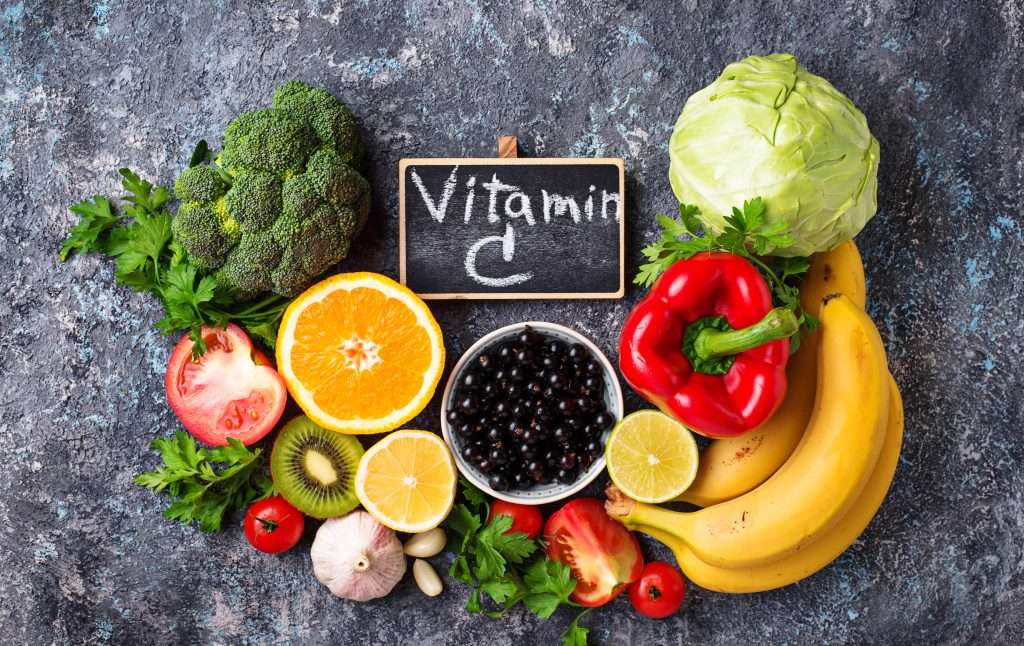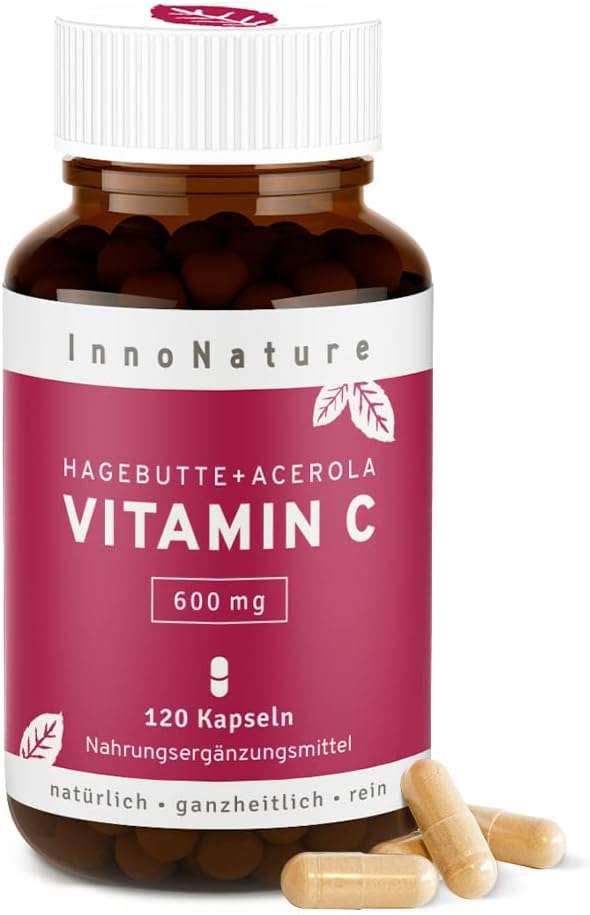Vitamin C ist ein wasserlösliches Vitamin, das für die Gesundheit eine große Bedeutung hat, da es an zahlreichen Stoffwechselvorgängen im Körper beteiligt ist. Es trägt zum Schutz aller Organe im Körper bei, indem es Giftstoffe und Schwermetalle ausscheidet und hilft außerdem, die Gesundheit des Zellgewebes zu erhalten.
Vitamin C ist in Obst, Gemüse, Nüssen, Samen und angereicherten Lebensmitteln enthalten.
Studien zeigen, dass Vitamin C dazu beitragen kann, das Risiko für einige chronische Krankheiten wie Krebs und Herzkrankheiten zu verringern. Die regelmäßige Einnahme von Vitamin C kann dazu beitragen, das Immunsystem zu stärken und Krankheiten wie Erkältungen und Grippe vorzubeugen.
Wirkung von Vitamin C
Vitamin C im menschlichen Körper ist für die allgemeine Gesundheit und das Wohlbefinden unerlässlich.
Wie bereits beschrieben, trägt Vitamin C dazu bei, alle Organe im Körper und das Zellgewebe vor Schäden durch freie Radikale zu schützen und gleichzeitig Schwermetalle und Giftstoffe auszuspülen.
Vitamin C spielt auch eine wichtige Rolle bei vielen Körperfunktionen wie Wundheilung, Kollagenproduktion, Hormonhaushalt, neurologischen Funktionen und sogar die Aufnahme von Eisen. Es ist wichtig für ein gesundes Immunsystem und wirkt nachweislich antiviral, entzündungshemmend und pilzhemmend.
Bei so vielen Vorteilen liegt es auf der Hand, dass die Aufnahme von einer ausreichenden Menge an Vitamin C in die tägliche Ernährung eine positive Wirkung haben kann. Dabei ist es egal, ob die Aufnahme über die Nahrung, z. B. Obst und Gemüse, oder in Form von Nahrungsergänzungsmitteln erfolgt.
Vitamin C für die Wundheilung
Vitamin C spielt eine wichtige Rolle bei der Wundheilung. Studien haben gezeigt, dass Vitamin C den Körper bei der Bildung von Kollagen unterstützt, das für die Reparatur und Regeneration von Gewebe notwendig ist. Kollagen ist eine Art von Protein, das im Bindegewebe des Körpers vorkommt und den Zellen Struktur und Festigkeit verleiht. Es trägt auch dazu bei, dass Wunden geschlossen und frei von Infektionen bleiben.
Vitamin C für den Hormonhaushalt
Vitamin C spielt eine wichtige Rolle für den Hormonhaushalt, da es den Körper bei der Produktion von Hormonen und Neurotransmittern unterstützt, die für die Regulierung der Körperfunktionen verantwortlich sind. Vitamin C unterstützt den Körper bei der Produktion von Adrenalin, einem Hormon, das an der “Kampf-oder-Flucht”-Reaktion beteiligt ist, sowie von Serotonin, das mit Wohlbefinden in Verbindung gebracht wird.
Vitamin C zur Unterstützung neurologischer Funktionen
Vitamin C spielt eine entscheidende Rolle für die neurologischen Funktionen, denn es trägt dazu bei, das Gehirn vor oxidativen Schäden zu schützen, hilft bei der Regeneration der Nerven und verbessert die geistige Gesundheit. Es hat sich gezeigt, dass Vitamin C dazu beiträgt, die Neuronen vor Schäden durch freie Radikale zu schützen, die zu Entzündungen und Störungen wichtiger elektrischer Signale im Gehirn führen können.

Vitamin C zur Unterstützung der Eisenaufnahme
Vitamin C spielt eine wichtige Rolle bei der Aufnahme von Eisen. Eisen ist unerlässlich für die Bildung roter Blutkörperchen und wichtig für die allgemeine Gesundheit und das Wohlbefinden. Vitamin C trägt dazu bei, die Aufnahme von Eisen aus der Nahrung zu erhöhen, die wir essen. Es hilft bei der Umwandlung der Nicht-Häm-Form von Eisen, die in pflanzlichen Lebensmitteln enthalten ist.

Vitamin C wirkt antiviral, antimykotisch und entzündungshemmend
Man hat festgestellt, dass Vitamin C antivirale, antimykotische und entzündungshemmende Eigenschaften hat. Dies ist in erster Linie auf seine Fähigkeit zurückzuführen, das Immunsystem zu stärken, indem es die Produktion weißer Blutkörperchen anregt, die Infektionen abwehren. Es trägt dazu bei, den Körper widerstandsfähiger gegen Viren, Bakterien und andere Krankheitserreger zu machen, indem es seine allgemeine Immunität erhöht.
Unterschied zwischen Vitamin C vs. Ascorbinsäure
Oft wird Vitamin C mit Ascorbinsäure gleichgesetzt, was es jedoch nicht ist. Der Unterschied zwischen Vitamin C und Ascorbinsäure besteht darin, dass Vitamin C der Oberbegriff für eine Gruppe von Verbindungen ist, zu denen auch Ascorbinsäure gehört. Ascorbinsäure ist eine organische Verbindung, die aus den Elementen Kohlenstoff, Wasserstoff und Sauerstoff besteht. Sie ist eine natürlich vorkommende Substanz, die in vielen Lebensmitteln wie Zitrusfrüchten enthalten ist. Vitamin C enthält auch mehrere andere Verbindungen, die als “Ascorbate” bekannt sind und ähnliche Eigenschaften wie Ascorbinsäure aufweisen, aber leicht unterschiedliche Moleküle sind. Obwohl sowohl Vitamin C als auch Ascorbinsäure einen antioxidativen Schutz bieten, deuten einige Forschungsergebnisse darauf hin, dass der Verzehr anderer Formen von Vitamin C neben der reinen Ascorbinsäure zusätzliche Vorteile mit sich bringt. Zu diesen Vorteilen gehören eine bessere Absorption und Verwertung im Körper, eine bessere Bioverfügbarkeit von Mineralien wie Eisen, eine stabilere Struktur unter bestimmten Umweltbedingungen wie pH-Änderungen oder Temperaturschwankungen usw. sowie eine höhere Wirksamkeit bei niedrigeren Dosen im Vergleich zu reiner Ascorbinsäure. Zusammenfassend lässt sich sagen, dass beide zwar ähnliche antioxidative Schutzeigenschaften gegen freie Radikale bieten, sich aber auf molekularer Ebene voneinander unterscheiden, was sich auf ihre Wirksamkeit im Körper auswirken kann, wenn es darum geht, ihre schützende Wirkung zu absorbieren und zu nutzen.
Vitamin C zur Vorbeugung folgender Krankheiten

Vitamin C - Hilfe bei Herzkrankheiten
Vitamin C ist ein wichtiges Antioxidans, das dazu beiträgt, den Körper vor Schäden durch freie Radikale zu schützen, die zu Herzkrankheiten beitragen können. Es wird mit der Senkung des Cholesterinspiegels und der Aufrechterhaltung eines gesunden Blutdrucks in Verbindung gebracht, was beides für ein gesundes Herz wichtig ist. Vitamin C kann auch dazu beitragen, Entzündungen im Körper zu verringern, die mit einem erhöhten Risiko für Herzkrankheiten verbunden sind.

Vitamin C - Hilfe bei Krebs
Die mögliche Rolle von Vitamin C bei der Krebsvorbeugung und -behandlung ist eingehend untersucht worden. Auch wenn der genaue Mechanismus noch nicht vollständig geklärt ist, haben Studien gezeigt, dass Vitamin C zur Verringerung von Entzündungen beitragen kann, einem Prozess, der mit der Entstehung und dem Fortschreiten von Krebs in Verbindung steht. Vitamin C spielt möglicherweise auch eine Rolle bei der DNA-Reparatur und hilft, Mutationen zu verhindern, die zu Krebs führen können.

Vitamin C - Hilfe bei Schlaganfall
Es wird vermutet, dass Vitamin C eine wichtige Rolle beim Schutz vor Schlaganfällen spielt. Studien haben gezeigt, dass ein höherer Vitamin-C-Spiegel mit einem geringeren Schlaganfallrisiko verbunden ist. Eine Studie ergab, dass Menschen mit der höchsten Vitamin-C-Zufuhr ein um 42 % geringeres Schlaganfallrisiko hatten als Menschen mit der niedrigsten Zufuhr.

Vitamin C - Hilfe bei Makuladegeneration
Es wird angenommen, dass Vitamin C eine wichtige Rolle bei der Vorbeugung von Makuladegeneration spielt, einer Erkrankung, die vor allem bei älteren Menschen zu Sehkraftverlust führt. Studien haben gezeigt, dass Menschen mit einem höheren Vitamin-C-Spiegel seltener an altersbedingter Makuladegeneration (AMD) erkranken. Vitamin C trägt zum Schutz der Augen bei, indem es die durch freie Radikale verursachten oxidativen Schäden reduziert.

Vitamin C - Hilfe bei Grauem Star
Man nimmt an, dass Vitamin C eine wichtige Rolle bei der Vorbeugung von Katarakten spielt, einer Erkrankung, die eine Trübung der Augenlinse verursacht und zu einem Sehverlust führen kann. Studien haben gezeigt, dass Menschen mit einem höheren Vitamin-C-Gehalt in ihrer Ernährung ein geringeres Risiko haben, an grauem Star zu erkranken. Vitamin C trägt zum Schutz der Augen bei, indem es freie Radikale neutralisiert.
Ursachen für Vitamin C Mangel
Vitamin-C-Mangel ist eine seltene, aber ernste Erkrankung, die unbehandelt zu Krankheiten wie Skorbut führen kann. Das Risiko eines Vitamin-C-Mangels besteht, wenn Sie nicht genügend Lebensmittel mit diesem Nährstoff zu sich nehmen oder wenn Ihr Körper Schwierigkeiten hat, ihn aus dem Verdauungstrakt zu absorbieren. Aber auch äußere Einflüsse wie Rauchen, regelmäßiges passives Rauchen oder Alkohol- und Drogenmissbrauch, die Einnahme von Medikamenten, schwere Krankheiten oder Magen-Darm-Erkrankungen sind Ursachen für einen Vitamin C Mangel.
8 Anzeichen von Vitamin C Mangel
- Müdigkeit und Schwäche
- Abgeschwächte Immunität
- Trockene Haut
- Langsamer Wundheilungsprozess
- Blutendes Zahnfleisch
- Geschwollene Gelenke und leichtes Prellen
- Haarausfall und brüchige Nägel
- Nasenbluten

Wie viel Vitamin C sollte täglich eingenommen werden?
Dies hängt von der jeweiligen Person ab, da jeder Mensch einen anderen Nährstoffbedarf hat. Im Allgemeinen sollten Erwachsene täglich zwischen 90 und 100 mg Vitamin C zu sich nehmen.
Es ist am besten, einen Arzt zu konsultieren, um die richtige Dosierung für Ihre individuellen Bedürfnisse zu bestimmen. Denn für Schwangere und Stillende Frauen bedarf es einer anderen Dosierung, ebenso für Menschen, die rauchen.
Hochdosiertes Vitamin C
Hochdosiertes Vitamin C wird empfohlen, wenn der Körper eines Menschen mehr als die reguläre Tagesmenge an Vitamin C benötigt, z. B. bei Krankheiten, Infektionen, Stress oder sogar Operationen. Während dieser Zeit kann eine Person zwischen 500 Milligramm und 10.000 Milligramm Vitamin C pro Tag benötigen.
Hochdosierte Vitamin C Infusionen
Hochdosierte Vitamin-C-Infusionen werden für viele Menschen, die sich von chronischen Krankheiten oder akuten Infektionen erholen wollen, immer mehr zum Mittel der Wahl. Durch die direkte Injektion einer hohen Konzentration von Vitamin C in den Blutkreislauf ist es möglich, viel höhere Konzentrationen dieses wirksamen Nährstoffs zu erreichen, als dies mit einer oralen Supplementierung allein möglich wäre.
8 Anzeichen von Vitamin C Überdosierung
- Übelkeit und Erbrechen
- Unterleibskrämpfe
- Durchfall
- Kopfschmerzen
- Sodbrennen und Verdauungsstörungen
- Müdigkeit oder Schläfrigkeit
- Hautausschläge oder Juckreiz
- Unregelmäßiger Herzschlag oder Herzklopfen

Vitamin-C-reiche Lebensmittel
Die meisten Menschen denken bei Vitamin C in erster Linie an Obst und Gemüse, aber auch einige Nüsse sind eine hervorragende Quelle. Mandeln, Haselnüsse, Cashewnüsse und Pekannüsse enthalten alle Vitamin C. Insbesondere Mandeln sind eine hervorragende Vitamin-C-Quelle und enthalten 17 % des empfohlenen Tagesbedarfs pro 100 Gramm.
Zu den Früchten mit hohem Vitamin-C-Gehalt gehören Orangen, Zitronen, Grapefruits, Erdbeeren, Kiwis und Clementinen. Andere Früchte mit hohem Vitamin-C-Gehalt sind Mangos, Wassermelonen, Papaya und Ananas.
Vitamin C ist auch in einer Vielzahl von Gemüsesorten enthalten, darunter Brokkoli, Grünkohl, Paprika, Spinat und Rosenkohl. Alle diese Gemüsesorten sind reich an Vitamin C und liefern bereits mit einer kleinen Portion mehr als die empfohlene Tagesdosis (RDA). Brokkoli ist besonders reich an Vitamin C.
Sollte Vitamin C supplementiert werden?
Im Allgemeinen wird empfohlen, Vitamin C aus verschiedenen Nahrungsquellen wie Obst und Gemüse zu beziehen. Für manche Menschen kann jedoch eine Nahrungsergänzung notwendig sein, wenn ihr Körper den Nährstoff nicht ausreichend über die Nahrung aufnimmt.
Es ist ratsam, vor der Einnahme von Nahrungsergänzungsmitteln einen Arzt zu konsultieren, da die Dosis von den individuellen Bedürfnissen abhängt. Der Arzt kann auch Lebensmittel mit hohem Vitamin-C-Gehalt für diejenigen empfehlen, die keine Nahrungsergänzungsmittel einnehmen möchten.
Die besten Vitamin-C-Supplemente - Unser Vorschlag
Innonature Vitamin C
Für uns persönlich verwenden wir, neben einer ausgewogenen Kost mit vielen Smoothies usw., folgendes Präparat um auch über die Wintermonate ausreichend mit Vitamin C versorgt zu sein.
Wenn auch du dieses Präparat, was nach bioverfügbaren Gesichtspunkten zusammengesetzt ist, verwenden möchtest, folge einfach unserem Link. Damit unterstützt du unsere Arbeit und wir können mehr wertvolle Informationen für dich vorbereiten.
Schau dir auch gerne das folgende Video über Vitamin C an:
Fazit
Vitamin C ist ein wesentlicher Nährstoff für unsere Gesundheit und unser Wohlbefinden und ist für den menschlichen Körper unerlässlich. Es trägt dazu bei, unsere Zellen, Organe und Gewebe vor Schäden zu schützen, die durch freie Radikale und Giftstoffe verursacht werden. Vitamin C hilft auch bei der Aufnahme von Eisen und trägt zum Aufbau starker Knochen und Zähne bei.


